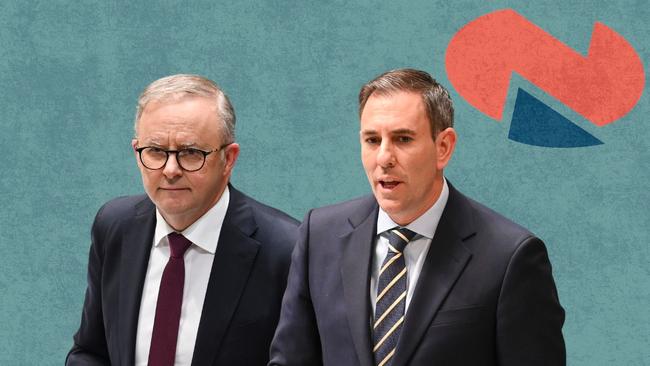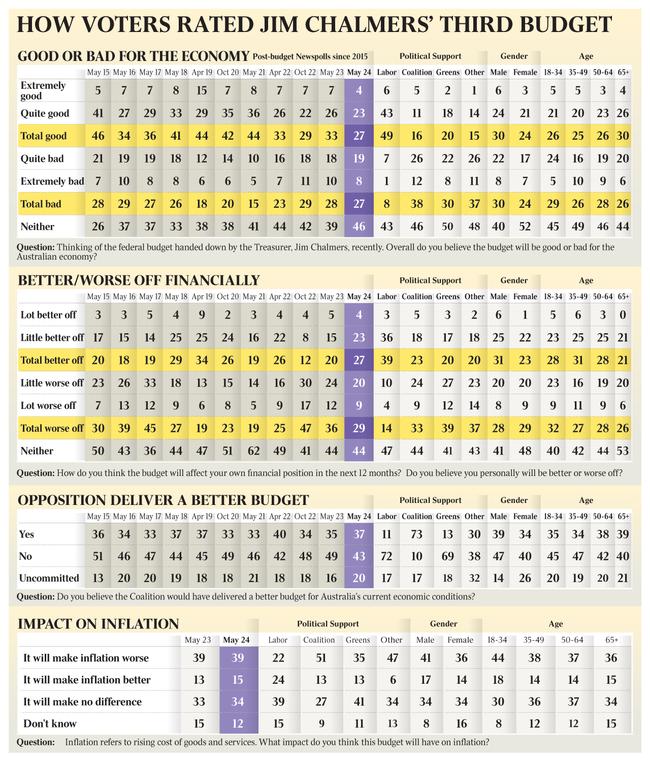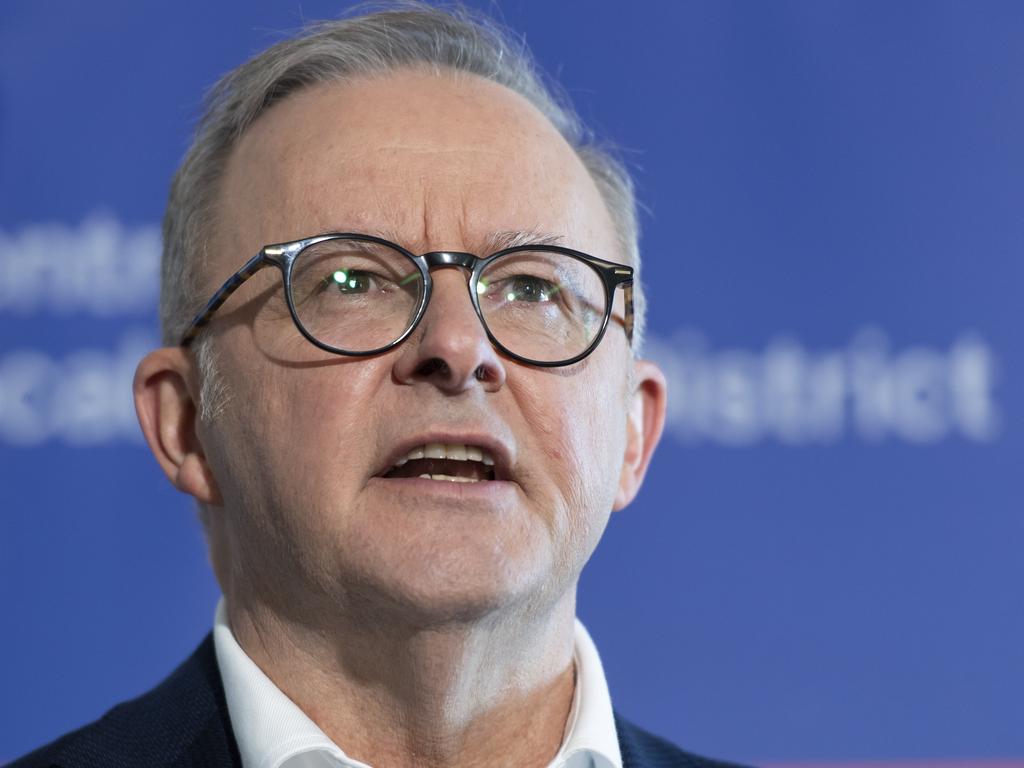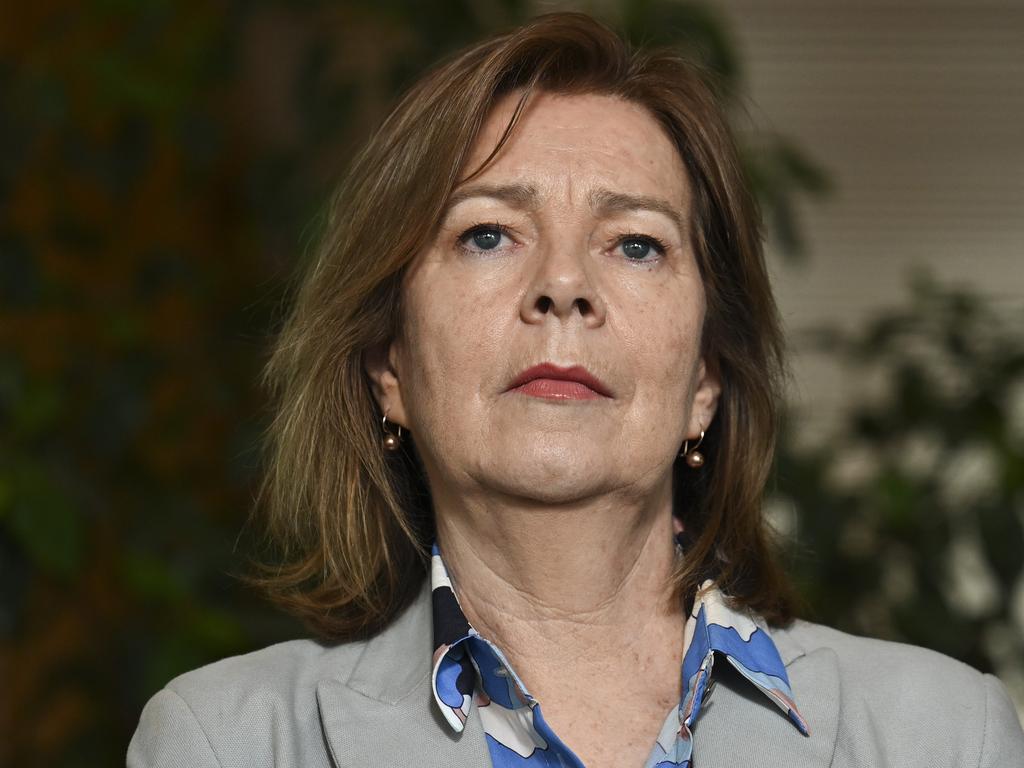Newspoll: Labor and Anthony Albanese up but voters mark down budget as bad for inflation and economy
A record low number of people have judged Jim Chalmers’ third budget as good for the economy, with a majority believing it will throw more fuel on the inflation fire.

Jim Chalmers’ third budget has fallen flat with voters amid a record low number of people judging it good for the economy and a majority believing it will throw more fuel on the inflation fire.
And less than a third of people believe they will be financially better off, despite a tax cut, rental assistance and a $300 energy subsidy, although this was higher than Labor’s previous two budgets. An exclusive post-budget Newspoll conducted for The Australian shows that despite the budget’s lukewarm reception, Labor’s primary vote lifted a point to 34 per cent, with the two-party-preferred vote also widening two points in its favour to 52-48. The Coalition’s primary vote fell a point to 37 per cent while the Greens lifted a point to 13 per cent. Overall, Labor has marginally improved its position on the last election.
Anthony Albanese has also returned to a neutral approval rating for the first time since the failed voice referendum and increased his lead over Peter Dutton as preferred prime minister.
The results will do little to dampen speculation of an early election, despite voters withholding their judgment on the broader economic impacts of the budget, with Labor strategists likely to judge the handouts as a vote winner. At the same time, voters do not buy Dr Chalmers’ most ambitious pledge to bring inflation back to the central bank’s target range of 2-3 per cent by Christmas.
A significant majority of voters, 39 per cent, believed the budget would be worse for inflation compared to only 15 per cent saying it would be good for inflation. These results mirror those from Dr Chalmer’s 2023 budget.
As he took Labor’s budget message to the marginal NSW Central Coast seat of Robertson on Sunday, the Prime Minister said he and his ministers would be crisscrossing the country selling both the new cost-of-living relief and his Future Made in Australia agenda.
“A tax cut for every taxpayer. Energy bill relief for every household. Strengthening Medicare for every community. And making a difference to people. Our priority was to provide cost of living relief without putting pressure on inflation. And we’ve done that. But a second priority as well is, of course, a Future Made in Australia,” Mr Albanese said at Gosford Hospital.
Dr Chalmers said last week that the cost-of-living package was designed to bring down headline inflation to within the central banks target band of between 2 and 3 per cent by the end of 2024.
Economists, however, have criticised the budget, claiming the spending would increase underlying inflationary pressures – the measure that the RBA uses to assess interest rate settings.

The Coalition labelled the budget as the “most irresponsible in history”, claiming hydrogen and critical minerals subsidies as billions of dollars for billionaire miners. It has also questioned why the $300 energy rebate was not means tested, despite saying it would not oppose it.
Mr Dutton responded to the budget by announcing the Coalition would slash the migration rate as a key cost-of-living measure designed to address the housing crisis.
He also pledged to push for uniform knife laws and tougher bail for domestic violence offenders.
Only 27 per cent of voters believed Labor’s budget would be good of the economy. This is the lowest score on this measure since Newspoll began assessing voters’ reactions to budgets in 1999. The same number of voters said it would be bad for the economy, which is an improvement on Dr Chalmers’ last two budgets.
However, voters appeared yet to be convinced by Labor’s growth plan for the transition to a green energy economy and its Future Made in Australia agenda, with 46 per cent saying it would be neither good nor bad. This was also a record number of uncommitted voters.
Asked whether they would be better or worse off in their own personal financial situation, 27 per cent of voters said they would be better off from the budget, compared to 29 per cent saying they would be worse off.
While this would suggest the budget has failed to address the cost-of-living concerns of most voters, it is a better result than the previous two Labor budgets.
The results are heavily skewed along party political lines, with almost half of Labor voters saying it would be good for the economy compared to only 16 per cent of Coalition voters.
Similarly, 39 per cent of Labor voters said they would be better off compared to only 14 per cent worse off. More Coalition voters said they would be worse off than better off.
On the question of whether the Coalition would have delivered a better budget for the current economic conditions, the margin has narrowed over previous budgets but a majority, 43 per cent, said no compared to 37 per cent who said yes.
While the budget’s overall economic strategy was questioned by voters, the cost-of-living measures appeared to pay dividends for Mr Albanese personally. The Prime Minister’s approval ratings lifted three points to 47 per cent. Those dissatisfied with his performance fell three points to 47 per cent. This is the first time Mr Albanese has been out of negative territory since the voice referendum last October.
Mr Dutton also improved his position, lifting two points to 38 per cent while his disapproval ratings fell a point to 50 per cent. He still remains in negative territory, however, with a net approval rating of minus 12.
Mr Albanese also extended his lead as preferred prime minister over the Opposition Leader, lifting four points to 52 per cent compared to Mr Dutton, who fell two points to 33 per cent.








To join the conversation, please log in. Don't have an account? Register
Join the conversation, you are commenting as Logout